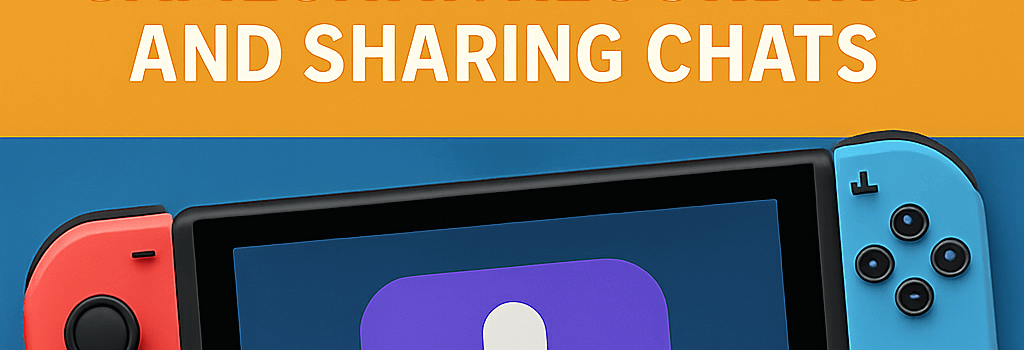Nintendo Switch 2 GameChat: Recording and Sharing Chats

When the Nintendo Switch 2 launched in May 2025, one feature stood out to privacy-conscious gamers: GameChat, Nintendo’s in-console voice and video chat system. Accompanied by an update to Nintendo’s privacy policy, GameChat makes clear that “your chat is recorded and stored temporarily” — a disclosure that has sparked both curiosity and concern. In this article, we examine the technical underpinnings of GameChat recording, retention policies, legal and privacy implications, and how Nintendo’s approach stacks up against rival consoles.
How GameChat Recording Works Under the Hood
Local Buffering and Encryption
GameChat audio is encoded using the AAC-LC codec at 48 kHz, while video (for users with the optional USB camera) is compressed in H.264 at up to 720p/30fps. Both streams are buffered in a dedicated 4 MB ring buffer inside the Switch 2’s dedicated audio/video subsystem. Each local device maintains a rolling cache of the last three minutes of conversation per session, encrypted with a per-device AES-256 key stored in the Nintendo Secure Processor (NSP).
Storage and Automatic Deletion
Once buffered, recordings are written to the user’s internal flash storage in an encrypted .gcdb container. Nintendo’s firmware enforces a strict 24-hour time-to-live (TTL) on these files: any clip older than one day is automatically purged by the background Media Maintenance Service (MMS) to prevent unbounded storage growth and minimize privacy risks.
When Clips Are Shared with Nintendo and Third Parties
By default, your buffered clips remain local and encrypted. However, if a user reports a Community Guidelines violation, Nintendo unlocks and transmits the relevant segments.
- User Reporting: During or after GameChat, pressing the C Button opens a session history. Gamers can select up to three recent sessions and highlight a specific 3-minute window.
- Secure Upload: The console establishes an HTTPS/TLS 1.3 connection to Nintendo’s cloud endpoints hosted on AWS and Azure. Clips are re-encrypted in transit using ephemeral session keys and uploaded with metadata (timestamps, Nintendo Account IDs, friend codes, and device traffic logs).
- Review and Disclosure: Nintendo moderators review flagged content via an internal dashboard. If a severe violation is confirmed, Nintendo may share data with law enforcement, courts, or external moderators under legal request, as stipulated in its GameChat Terms.
“Your chat is recorded and stored temporarily on your system and on the systems of others you chat with. To report chat content, highlight up to the last three minutes of any of your last three sessions. Reports must be submitted within 24 hours.”
— Nintendo GameChat Terms (June 2025)
Privacy, Legal, and Regulatory Considerations
Nintendo’s approach is designed to be minimally invasive: local storage, automatic deletion, and manual user initiation for sharing. Nevertheless, the system raises several questions:
- GDPR and CCPA: Temporary recordings may be considered personal data under European GDPR and California’s CCPA. Nintendo’s privacy policy asserts compliance by deleting data after 24 hours and only processing clips on explicit user reports.
- Data Security: End-to-end encryption and hardware-backed keys in the NSP mitigate unauthorized access. However, security experts caution that any local storage can be vulnerable to jailbroken consoles or forensic extraction.
- Lawful Access: In the U.S., Nintendo states it will respond to valid subpoenas or search warrants. Gamers in other jurisdictions should review local gaming laws regarding communication interception.
Comparisons with Xbox and PlayStation Chat
Microsoft’s Xbox Party Chat and Sony’s PlayStation Voice Chat both route voice streams through company servers for relay and moderation. Unlike Nintendo, these systems often retain transient copies in memory only and rely on automated toxicity filters rather than user-initiated reporting of recorded clips. Nintendo’s hybrid local-first model strikes a balance between privacy and parental controls, especially in its verification of phone numbers and friend lists before enabling chat.
Expert Perspectives
Dr. Lena Müller, a privacy researcher at the Digital Rights Foundation, notes: “Nintendo’s temporary local storage with a 24-hour TTL is a smart compromise. It reduces the footprint of stored data, but users must trust that the ring buffer cannot be misused by third-party apps or in the case of hardware exploits.”
James Kim, a network architect who has worked on VoIP gaming backends, adds: “Requiring manual reporting ensures that only relevant snippets are uploaded, saving bandwidth and storage costs. The AES-256 encryption within the NSP is on par with industry best practices.”
Best Practices for GameChat Users
- Enable two-factor authentication on your Nintendo account.
- Only accept GameChat invitations from known friends and family.
- Keep your Switch 2 system firmware updated to ensure the latest security patches.
- Use the Nintendo Parental Controls app to monitor minor accounts and require approvals for chat use.
By understanding the technical and policy aspects of GameChat recording, players can make informed decisions about privacy while enjoying seamless voice and video communication on Nintendo Switch 2.